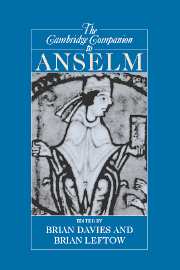Book contents
- Frontmatter
- Introduction
- 1 Anselm’s life, works, and immediate influence
- 2 Anselm on faith and reason
- 3 Anselm, Augustine, and Platonism
- 4 Anselm’s philosophy of language
- 5 Anselm on modality
- 6 Anselm’s perfect-being theology
- 7 Anselm and the ontological argument
- 8 Anselm’s account of freedom
- 9 Anselm on truth
- 10 Anselm on ethics
- 11 Anselm on the Trinity
- 12 Anselm on atonement
- Bibliography
- Index
10 - Anselm on ethics
Published online by Cambridge University Press: 28 May 2006
- Frontmatter
- Introduction
- 1 Anselm’s life, works, and immediate influence
- 2 Anselm on faith and reason
- 3 Anselm, Augustine, and Platonism
- 4 Anselm’s philosophy of language
- 5 Anselm on modality
- 6 Anselm’s perfect-being theology
- 7 Anselm and the ontological argument
- 8 Anselm’s account of freedom
- 9 Anselm on truth
- 10 Anselm on ethics
- 11 Anselm on the Trinity
- 12 Anselm on atonement
- Bibliography
- Index
Summary
There is a real question about whether Anselm developed anything like a systematic ethical theory. Indeed, scholars have sometimes suggested that his treatment of ethical matters consists in little more than recapitulation of ethical principles implicit in Scripture or transmitted to him by Christian thinkers such as Augustine and Boethius. The truth of the matter, however, is quite the opposite. Although it is easy to overlook the systematic nature of Anselm's ethical theorizing, as well as its genuine originality, his contribution to medieval ethical theory is considerable. Admittedly, none of his philosophical or theological works is devoted to the systematic presentation of ethical issues; nor is there much novelty to be found in them at the level of specific ethical principles. Nonetheless, it is possible to extract from his works something that moral philosophers today would recognize as a worked-out ethical theory - one that includes a sophisticated moral metaphysics, moral semantics, and moral psychology.
- Type
- Chapter
- Information
- The Cambridge Companion to Anselm , pp. 222 - 256Publisher: Cambridge University PressPrint publication year: 2004
- 10
- Cited by

